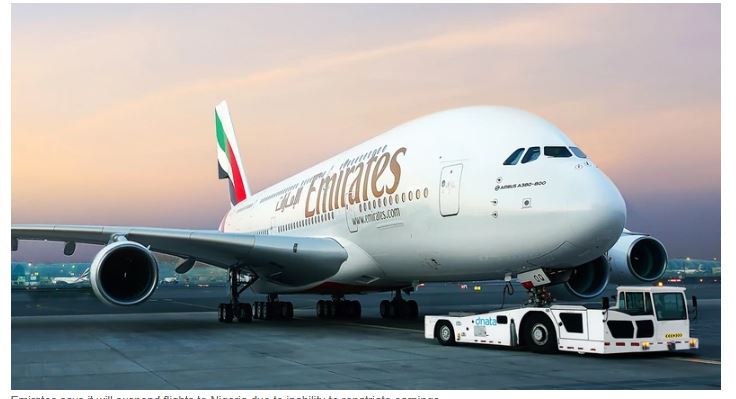Emirates Airlines resumed its flight operations to Nigeria on Tuesday after a two-year suspension caused by unresolved issues, including foreign exchange restrictions. Its Flight EK 783 landed at Lagos Murtala Muhammad International Airport (MMIA) at 3:32 pm, marking the first time the airline has touched down in Nigeria since its services were halted.
The airline’s return has sparked discussions about its potential impact on Nigeria’s economy, with experts hopeful that it will positively affect both tourism and trade.
Join our WhatsApp ChannelSparse Passenger Load on First Flight
Despite the excitement around the airline’s return, the Boeing 777-300ER, capable of carrying 392 passengers, arrived with many empty seats. One passenger on the flight remarked, “The flight was not full at all, but the services were very good, as usual. I think this is understandable being the first flight after many years.”
Several other passengers also noted that the return was a welcome development but acknowledged that the impact of Emirates Airlines’ suspension could still be felt in Nigeria’s air travel sector.
Impact on Nigeria’s Economy
Emirates Airlines stopped its services to Nigeria two years ago over issues related to its trapped funds. These funds, blocked by foreign exchange restrictions, left the airline in a prolonged dispute with Nigerian authorities. With the resumption of services, the airline aims to reestablish its connection with Nigeria and help revive its international air traffic.
An aviation analyst, speaking on the potential benefits of Emirates Airlines’ return, said, “The resumption of Emirates flights could have a significant impact on Nigeria’s economy. It opens up business opportunities and improves travel between Nigeria and the UAE.”
Airlines and Foreign Exchange Challenges
The issue of airlines’ trapped funds has been a recurring problem in Nigeria, especially with the country’s foreign exchange shortages. Emirates Airlines was one of several international airlines affected by this issue. The suspension of services not only disrupted travel for Nigerian passengers but also hampered commercial activities that depend on seamless international transport.
By resuming flights, Emirates Airlines hopes to capitalise on Nigeria’s large market, and in turn, Nigeria stands to benefit from increased tourism and trade with the UAE.
One official at the MMIA said, “We are happy to see Emirates Airlines back. Their presence adds value to our economy and brings more options for travelers.”
As Emirates Airlines looks to strengthen its ties with Nigeria, the focus will now shift to how the airline navigates the ongoing foreign exchange challenges. The hope is that its return will stimulate both travel and commerce, giving Nigeria’s economy a much-needed boost in these challenging times.
Emmanuel Ochayi is a journalist. He is a graduate of the University of Lagos, School of first choice and the nations pride. Emmanuel is keen on exploring writing angles in different areas, including Business, climate change, politics, Education, and others.


















